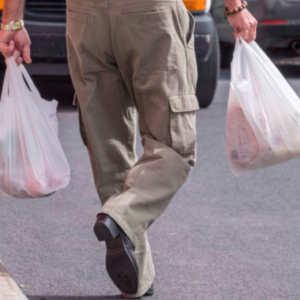With a state prohibition on plastic straw and bag bans set to expire this year, some Delaware Valley municipalities are putting their own into effect, while others are similar steps. At the same time, critics of the bans point to a growing body of scientific evidence that alternatives to reusable plastic bags do more harm than good.
In 2018, Narberth became the first town to pass a plastic bag and straw ordinance in the state. Mayor Andrea Deutsch was initially skeptical of the idea.
“I am a retailer, I own a pet shop in the borough,” she said. “I was a little hesitant, I wanted to learn more.”
Once she discovered it wouldn’t be a ban altogether, merely a 10 cent fee on the use of plastic bags, the proposal earned her support. And her description of how it works now makes it appear it’s doing just what was intended.
“I found [customers] using about 75 percent fewer bags [in my store]. It made a remarkable difference,” she said.
West Chester passed a plastic bag ban in 2019.
“A group of fifth-graders from the West Chester Friends school said we really want to ban plastic bags and straws in the borough,” said state Rep. Dianne Herrin (D-West Chester), who was mayor of the borough when the bans were being debated. “I’ve worked on environmental issues most of my career… so I said, ‘Great. Let’s work on this together.’”
But the borough’s ban has never been put into effect. That’s because in 2019 the statewide budget included language that made new plastic bans illegal. Nevertheless, the borough council still voted narrowly to pass the West Chester ban.
Herrin said the ban was met with widespread support in the community. “In fact, many of our businesses had already transitioned to recycled paper bags.” She recalled only one business had strong opposition. Then again, the ban hasn’t been put into place yet, either.
The case for the plastic bans was summed up by Stephanie Wein, a clean water and conservation advocate at PennEnvironment: “Nothing we use for 15 minutes should pollute the environment for 1,000 years. It never goes away.” Plastic, in Wein’s eyes, is easy to substitute, and she sees the bans as only tackling the low-hanging fruit in terms of conservation.
However, critics of the bans note research showing shoppers frequently forget to bring their own bags and end up using plastic bags instead.
And even when they do bring their cloth or synthetic textile bags, the data are clear: Reusable bags must be reused a significant number of times—between 50 and 100 times based on the kind of bag—to make them less damaging to the environment than commonly-used plastic shopping bags. And ending the use of plastic shopping bags would increase— not decrease — CO2 emissions because of the amount of energy required to manufacture and ship paper bags.
Wein concedes that but says there are ways to address it.
“The calculations of the lifecycle climate emissions of paper vs. plastic don’t include the emissions from the natural gas drilling that gets us the plastic in the first place,” Wein argued. She contends paper bags come out on top in terms of conservation, though studies show they generate far more carbon emissions.
Wein also added that “the greenest bag is the one we don’t make in the first place.” By having people use their bags over and over again, there will have to be fewer produced. But there will also be more reusable bags produced, each one generating a carbon footprint.
In Narberth, Deutsch said they did community outreach through many means to inform residents about what the ban would mean. “There was an effort to put out a FAQ or question and answer sheet, there were meetings with the business association… borough council went around and they worked hard to let people know how it would be implemented.”
Both Narberth and West Chester are small boroughs, so there could be a question about why they feel they could have a large impact on the environment by passing these measures.
“Doing it in isolation wouldn’t have that big of an impact when you look at how big this problem really is,” said Herrin. “But West Chester has always positioned itself as a leader on environmental issues… it was our hope other municipalities would follow suit, and that’s what’s happening.”
But following suit was more difficult when the budget language in 2019 was designed to prohibit these types of bans. Narberth, West Chester, Philadelphia, all of which had passed plastic bag bans, and Lower Merion, which had considered passing one, sued the state to change the budget language. This year’s budget no longer includes that language, meaning the prohibition is set to expire in December.
Why the budget’s language changed is unclear. Herrin was surprised not to see it in the budget this year. “When I reviewed the budget and realized it wasn’t in there, I was very happy. But I don’t know the reason.”
A source knowledgeable with the budget negotiations explained there was no plan to extend the ban last year when it was set to expire, and it was only extended this year due to the pandemic.
With the ban now lifted, other towns may see this as the opportunity to move forward with their own proposals.
“I think there are a dozen towns in my inbox right now we’re having active conversations with, and across the state,” said Wein. She added municipal governments now have “every tool in the toolbox back available to them.”
“I think many other municipalities now view this as a green light to go ahead and adopt their own ordinances and move forward with bans,” said Herrin. And she plans to push at the statewide level for action too. “I think this is a little opening for us to begin to really push this issue and I will definitely be participating in that.”

